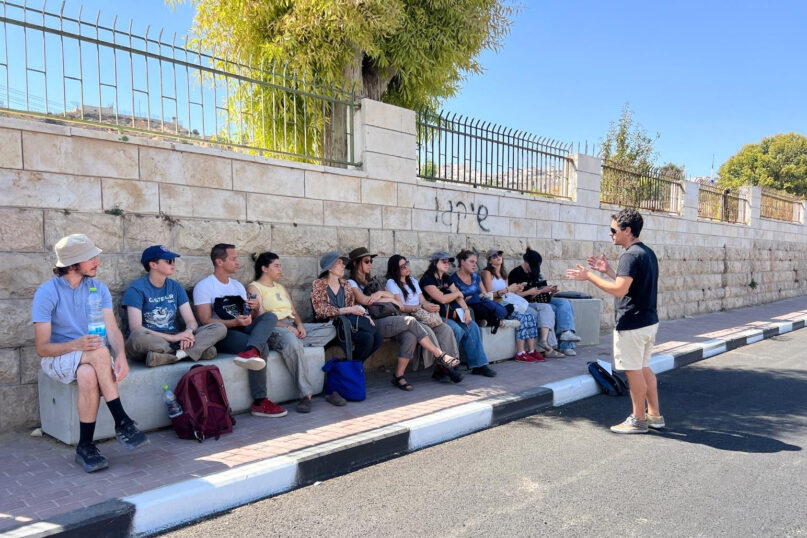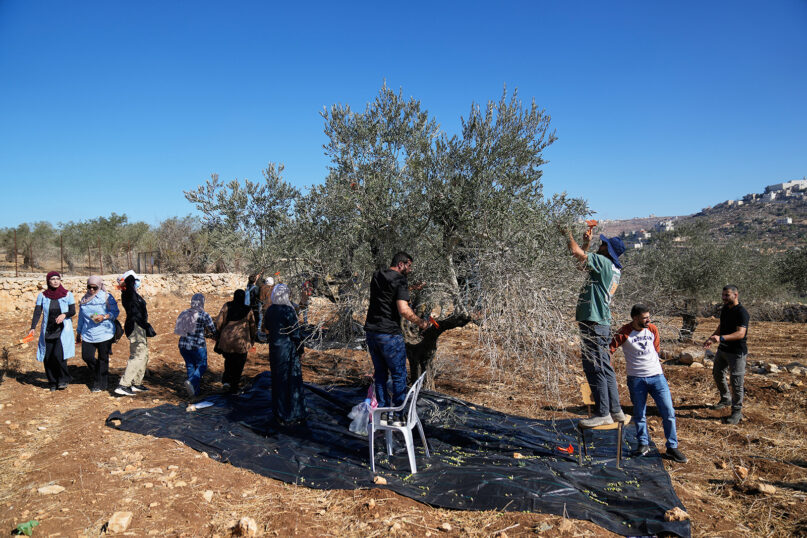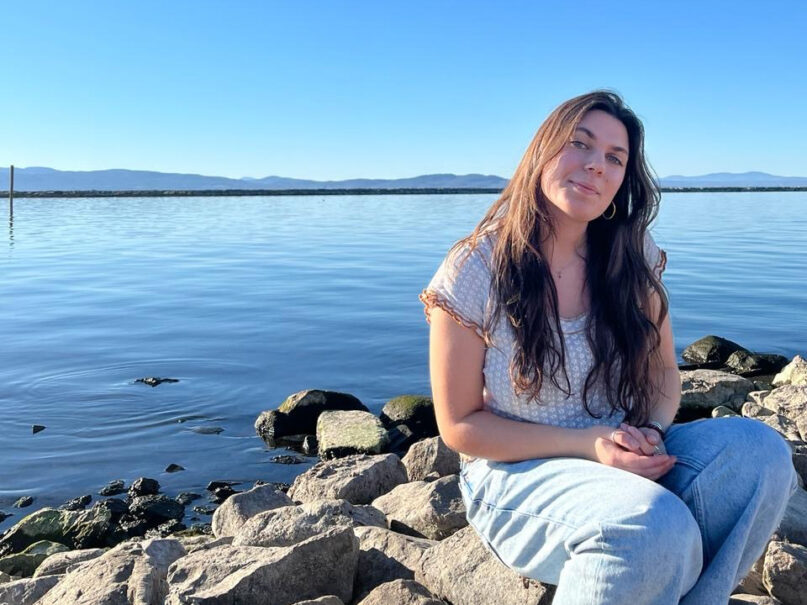(RNS) — Leila Stillman-Utterback assumed she had a certain privilege working with Palestinians in the West Bank in their struggle against violent settlers who are threatening their lives and livelihoods.
She was, after all, an American Jew.
So, on a four-month solidarity program in Israel, the 18-year-old high school graduate from Vermont volunteered to be among Palestinians as part of a protective presence campaign in the South Hebron Hills. She also spent several days helping Palestinians in a different part of the West Bank pick olives during their fall harvest amid intensifying attacks from settlers.
But on Oct. 29, she and another American Jewish volunteer were arrested in the Palestinian village of Burin, deported from Israel and banned from returning for 10 years.
“I had always been told that my Jewishness protected me from deportation,” said Stillman-Utterback, speaking to RNS from her family home in Vermont. “I understand that the current government does not want people like me or like other activists doing work in the West Bank, but I think I felt a sense of betrayal. I was being told that I was not the right kind of Jew.”
RELATED: Israel deports two US Jews who volunteered to help Palestinians pick olives
Israel has begun deporting international activists volunteering to help Palestinians in the West Bank. Since the beginning of the olive harvest this fall, 42 such activists have been deported, according to evidence presented by the Israeli police at a hearing in the Knesset, or Israeli parliament.
But the deportation of American Jews, in particular, appears to be a significant escalation. Since its founding in 1948, Israel has welcomed American Jews and encouraged their immigration. At least 150,000 American Jews have moved there. American Jews have raised billions of dollars for Israel and have volunteered there in droves, especially after the Hamas attacks on Oct. 7, 2023.
But many American Jews have also sought to work toward what they see as a fairer, more equitable Israeli society. As Jewish settler attacks against Palestinians in the occupied West Bank have spiked in number and severity, American Jews and others, alongside Israelis on the left, have sought to resist.

Achvat Amim, or “Solidarity of Nations,” is a Jerusalem-based organization that engages with the Israeli-Palestinian region through grassroots human rights work and education. More than 60% of its participants are U.S. Jews. (Photo courtesy of Achvat Amim)
Several Jewish groups, including Achvat Amim, or Solidarity of Nations, and Rabbis for Human Rights, have mobilized to prevent human rights violations and to live out Jewish values of care for the stranger.
“Settler violence is out of control at the moment,” said Anton Goodman, director of partnerships for Rabbis for Human Rights. “This is very worrying, and this is happening across the West Bank, and it’s going unchecked with total impunity. The authorities are not cracking down on it. What they’ve chosen to crack down on instead is those people who are coming to volunteer to pick olives with Palestinians.”
On Wednesday (Nov. 5), dozens of masked settlers descended on an industrial zone in the northern West Bank, setting cars, fields and several buildings ablaze.
Stillman-Utterback also spoke by Zoom about her experience in a Knesset hearing on Wednesday.
Before heading off to college, she said, she signed up for the program in Jerusalem to learn more about the Israeli-Palestinian conflict and volunteer with Palestinians.
Her mother, Danielle Stillman, is a rabbi and associate chaplain at Middlebury College. Stillman-Utterback grew up in a Jewish home imbued with Jewish traditions.
“I was taught very strongly that at the center of Judaism is being accountable for making the world a better place, and for honoring all human life,” Stillman-Utterback told RNS. “When I learned about and then started to see the extremist settler violence in the West Bank and Israel’s actions in Gaza, it went against what I knew to be central to Judaism.”
The Stillman-Utterbacks had spent a year living in Jerusalem when Leila was in 10th grade and her mother was taking a sabbatical at a Conservative movement seminary. During that year, Leila attended weekly demonstrations against the government’s plans to remake the judicial system, which many Israelis protested, viewing the plans as an effort by the right-wing government to remove basic guardrails of democracy.
She arrived back in Israel on a tourist visa in September and spent the first part of the fall learning about the conflict as part of Achvat Amim’s 12-member cohort.
Achvat Amim does not take a political position on the conflict but works toward “self determination for everyone who calls this place home.” Between 60% and 80% of its participants are U.S. Jews.
Since starting the program, Stillman-Utterback spent some time doing protective presence work in Masafer Yatta, a collection of 19 hamlets recently portrayed in the 2024 Oscar-winning documentary “No Other Land.” And she volunteered with a group from Rabbis for Human Rights to help Palestinians under attack to harvest their olive trees, a critical part of their livelihoods.
Israeli settlers have targeted the olive harvest in recent years, unleashing waves of violence. Across the West Bank, settlers have cut, bulldozed, uprooted and set olive trees on fire.
Stillman-Utterback harvested olives at least six times this fall, without incident, prior to getting on a minibus on the morning of Oct. 29 alongside a group from Rabbis for Human Rights. The group of 11 set out for the village of Burin in the northern West Bank.

Foreign peace activists and volunteers help Palestinian farmers harvest their olive trees in the West Bank town of Silwad, Oct. 29, 2025. (AP Photo/Nasser Nasser)
As the bus she was riding in approached the village, it was stopped by the army, and the group was told that the area was a closed military zone. The group then decided to approach the olive groves from another direction. They made it to the groves and spent two hours picking olives.
As they headed back to the bus, the army approached them once again and took them all to the police station in the town of Ariel. There they were detained for several hours and their phones were confiscated. At first, Stillman-Utterback said she wasn’t too worried. The Israeli citizens in the group were questioned and released with a promise not to return to the West Bank for 15 days.
But then Stillman-Utterback and another American Jewish woman were told they would face a deportation hearing at 3 a.m. at Ben Gurion International Airport.
The decision to deport was swift. Stillman-Utterback said she assumed the authorities were acting on the assumption that she had entered a closed military zone. She said she did not know where she was or what the zone’s boundaries were.
There were no seats available that day on flights to the U.S., and the two women were shuttled to a detention facility in Ramleh for one more day and another administrative hearing — via Zoom — before boarding a flight to the U.S. on Oct. 31.
“It became clear to me that the situation had kind of moved out of my hands, and it didn’t really matter what I would say in those hearings,” said Stillman-Utterback. “I don’t think the system had much respect for the details of whether I was innocent or guilty, or what had really happened that day. A decision was made based on the fact that we had both been helping Palestinians and doing solidarity work.”

Leila Stillman-Utterback, 18, during a solidarity program in Israel. (Photo courtesy of Leila Stillman-Utterback)
In a press statement, the Israeli police said they were “acting firmly and in accordance with the policy of the Minister of National Security, Itamar Ben Gvir, and the directives of Israel Police Commissioner Daniel Levy, to locate and stop foreign elements engaged in intentional provocations that generate clashes and misrepresent events in the area, undermining public safety.”
Stillman-Utterback and the other American, who declined to be identified, are appealing the ruling. Both Achvat Amim and Rabbis for Human Rights are paying for their appeal and have hired a lawyer from the Human Rights Defenders Fund, a legal firm in Israel.
Both groups said no one in their programs has been deported before.
“There’s no question that incidents like this show how rapidly the reality on the ground is changing and how we need to update our practices and have constant conversations with our participants so they understand the risks that they’re taking,” said Becca Strober, Achvat Amim’s education director.
The Achvat Amim program is open to adults — Stillman-Utterback is among the youngest — and they will be the ones deciding where they want to do their solidarity work, Strober said.
Stillman-Utterback plans to travel and spend time with friends this winter. She’s been accepted to Williams College in Williamstown, Massachusetts, next fall and is thinking of majoring in international relations and philosophy.
Her connection to Israel remains strong, she said.
“It feels tragic to me to think about not being able to go back for 10 years,” Stillman-Utterback said.
At the same time, she understands she is not welcome there.
“I think my deportation is a sign to people like me that it’s unsafe for us to do this work, and that this is not the kind of Judaism that the Israeli government wants to support. They want to support a Judaism that allows for violence. The violent actions of the settlers directly goes against what I see as Judaism.”
RELATED: States are pushing for more scrutiny of antisemitism in schools



